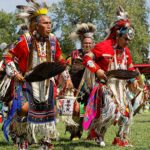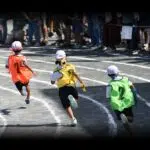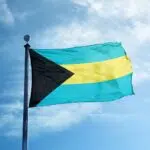Sports Day, formerly known as Health-Sports Day, is celebrated in Japan on the second Monday of October every year. This year, the day falls on October 10. The aim is to promote sports and an active lifestyle to ensure a healthy mind and body, and it commemorates the opening of the 1964 Summer Olympics held in Tokyo. This day is used by many schools and businesses to hold their annual Field Day. It typically consists of a range of physical events ranging from more traditional track-and-field events such as relay races to more uncommon events such as the tug of war and the ‘Cavalry Battle.’
History of Health and Sports Day (Japan)
The very first Health and Sports Day was held on October 10, 1966, two years after the 1964 Summer Olympics. To avoid the Japanese rainy season, October was chosen for the unusually late Summer Olympics. In the year 2000, Health and Sports Day was moved to the second Monday in October as a result of the Happy Monday System, a set of modifications to Japanese law creating three-day weekends.Starting in 2020, Health and Sports Day was permanently renamed Sports Day, known as ‘Supōtsu no hi’ in Japanese. The reason for this is that the word ‘sports’ is broader than physical education and it also implies voluntary enjoyment. It follows suit with other organizations that have made or plan to make similar changes to their name in Japanese, such as the Japan Sports Association and the National Sports Festival of Japan.To coincide with the opening of the 2020 Summer Olympics, a special arrangement was made to move the 2020 date for Sports Day to July 24. With the Olympics and Paralympics postponed until 2021, this change was left in place for 2020, and the government passed an amendment to the Olympic and Paralympic Special Measures Act to make a corresponding change to the holiday in 2021, moving it to July 23 for that year.The festival usually begins with a parade featuring all the different teams that will be participating, divided by neighborhood, class, geographic area, or school. A local marching band normally plays, followed by a performance of the national anthem ‘Kimigayo’ and the raising of the Japanese flag. Local officials make speeches to welcome everyone, the people spread across the grounds to stretch, and the events finally begin.
Health and Sports Day (Japan) timeline
Two years after the 1964 Summer Olympics, the first Health and Sports Day is held to coincide with the date of the opening of the Olympics.
Health and Sports Day is moved to the second Monday in October as a result of the Happy Monday System.
The holiday is renamed, following suit with other organizations, such as the Japan Sports Association and the National Sports Festival of Japan.
The aim is for it to coincide with the opening of the 2020 Summer Olympics, but as it gets delayed to 2021, it is moved to July 23 the next year.
Health and Sports Day (Japan) FAQs
What is the main sport in Japan?
Their national sport is baseball. Nowadays, even primary schools have their own baseball teams.
What is ‘bunkasai’ in English?
‘Bunkasai’ are school festivals that take place in autumn throughout October and November in all schools and universities in Japan.
What does ‘undokai’ mean in Japanese?
‘Undokai’ is the word for the sports festival. It combines the Japanese word ‘undo,’ meaning ‘exercise,’ and ‘kai,’ ‘gathering.’
Health and Sports Day (Japan) Activities
-
Participate in a sports festival
Most communities and schools in Japan celebrate like this. They include many of the traditional track and field events, such as relay, sprinting, and long jump. Other activities include ball toss, tug of war, rugby-ball dribbling races, sack races, and many more.
-
Participate in an exciting relay
Another common event is an obstacle course relay including many different challenges. These include three-legged races, carrying an ‘injured’ teammate with a stretcher made with a blanket and bamboo poles, laundry hanging, crawling on tug-o-war hands and knees under a net, and doing cartwheels across a mat.
-
Practice stretching
This is an event people of any age are encouraged to do, even alone in their homes. Stretching routine music, which was developed by the government, is broadcast daily on the radio and T.V. for people to follow along with the program.
5 Fun Facts About Sports Day
-
They roll giant balls on this day
A very unusual sport done at these festivals is ‘oodama okuri’ — divided into teams, they pass it back and forth above their heads in the shortest possible time.
-
It’s still popular with the elders
A survey by the Japan Sports Agency in 2019 showed that the proportion of people who do exercise or sports once a week or more is over 70% among most elderly age groups.
-
Many museums stay open on this day
Those that normally close on Mondays might stay open on Sports Day and close on Tuesday, the following day.
-
It’s a lot like the Olympics
It’s not just the sports, the field days also include torch carrying and lighting ceremonies.
-
Junior high schoolers set a world record
The third-year boys at a school in Saitama Prefecture built a six-person high human wall and then walked forward about 328 feet during one of these events.
Why We Love Health and Sports Day (Japan)
-
It encourages a healthy and active lifestyle
Many adults grow up to develop a sedentary lifestyle. This is why it’s important to teach people the importance of staying active and that sports can be fun from an early age.
-
It commemorates the 1964 Summer Olympics
This was the first time the Olympics were held in Asia, the first to be broadcast on television internationally without the need for tapes to be flown overseas, and the first to have color telecasts. For these reasons, it’s of particular historical significance.
-
It’s a free Monday
This day gives most people a much-needed break from studying or work. Even if they are not participating in an event, parents can take the day to see their children at the sports festival.
Health and Sports Day (Japan) dates
| Year | Date | Day |
|---|---|---|
| 2022 | October 10 | Monday |
| 2023 | October 9 | Monday |
| 2024 | October 14 | Monday |
| 2025 | October 13 | Monday |
| 2026 | October 12 | Monday |







































